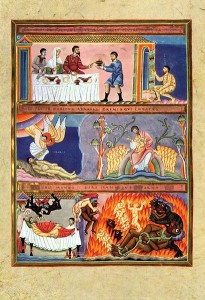Thoughts on Today’s Lessons for Sunday, Sept. 29, 2013.

Lazarus and Dives, illumination from the Codex Aureus of Echternach
The bible is tough on the rich! Most of the prophets come down very hard on rich people, and of course, so does Jesus … as we see in today’s Gospel. The prophet Amos warns Israel and Judah that the idle rich – with emphasis on the “idle” – will be the first to go into exile when grief and destruction bring an end to their revelry. Amos isn’t just angry because the rich lead lavish lives of luxury, but because they don’t care about “the ruin of Joseph,” the ordinary people of Israel. Their failure is in community: They do not love their neighbor.
Psalm: Psalm 146
Today’s Psalm bursts out with loud shouts of praise. “Praise the Lord! Praise the Lord, O my soul!” Now hear why God earns our high hosannas: God brings justice to the oppressed and lifts up the depressed. God feeds the hungry. God sets prisoners free, heals the blind and loves the righteous, those who offer justice to their neighbors. Does all this remind us of anything that Jesus said?
Second Reading: 1 Timothy 6:6-19
This letter to Timothy reiterates the duty of those with riches to care for their neighbors. Indeed, the first verse could be restated as the familiar, “You can’t take it with you!” and the second sets down familiar wisdom: “The love of money is the root of all evil.” It’s fine to want food and clothing, the author assures us. But we get in trouble when we’re tempted by more luxurious delights. Don’t count on your riches but on God, the author urges. Do good, be rich in good works, and share, and you’ll be ready for God’s Kingdom.
Gospel: Luke 16:19-31
First, a bible trivia point: This Lazarus is not Jesus’s friend Lazarus, brother of Mary and Martha, who he brought back from the dead. “Lazaros” is Greek for the Hebrew “Eliezer” which means “God helps,” and the choice of names is important in this parable because Genesis names Eliezer as the servant of Abraham! At first glance, this appears to be a simple story with a moral: The selfish rich man wouldn’t help Lazarus. Now he’s scorching in Hades, Lazarus is comfortable in Abraham’s arms, and justice seems served. But like so many of Jesus’s parables, there is deeper, richer texture here. Why does the rich man even think Lazarus should help him? Why won’t Abraham let Lazarus warn the rich man’s brothers of his fate? In light of today’s readings, what do you think?
